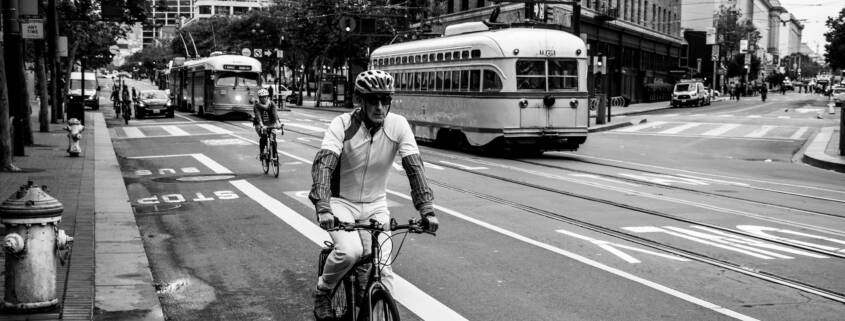Bike Riders’ Right to Safe Streets Tested in Court
The question of whether municipalities have a responsibility to maintain safe streets without hazards that could injure people riding bikes has been raised in California recently. CalBike joined an amicus brief in a court case that could have let cities off the hook if injured bike riders had signed a third-party waiver. Thankfully, the California Supreme Court struck that down. However, the Los Angeles City Attorney is lobbying for a state law to cap awards and limit liability for cities that fail to maintain their streets everywhere in California.
Here’s where bike riders’ rights are being challenged and what CalBike is doing to defend them.
Crucial court victory for bike safety
The case of Whitehead v. the City of Oakland threatened to set a bad precedent for bike safety, so CalBike weighed in along with Bike East Bay and the San Francisco Bicycle Coalition. We filed an amicus brief supporting cyclist Ty Whitehead’s lawsuit against Oakland for the serious injuries he sustained in a crash on bad pavement on Skyline Boulevard. Last week, the California Supreme Court agreed, upholding the responsibility of cities to maintain safe street conditions for bike riders.
Initially, a trial court agreed with the City’s argument that the liability waiver Whitehead had signed with AIDS Lifecycle applied to it, since he was on a training ride. If that ruling had held, it could have created a liability loophole, absolving other municipalities from responsibility for fixing potholes and other issues that can be extreme hazards to people on bicycles.
Shaana Rahman of Rahman Law prepared our amicus brief supporting Whitehead’s arguments that the city was liable for his injuries. The Supreme Court’s opinion ruled that Oakland can’t hide behind the AIDS Lifecycle waiver, but it isn’t the end of the case, which returns to the Alameda County Superior Court. The City of Oakland could try other, perhaps equally harmful, arguments to escape liability. We will continue to keep an eye on this case.
Giving cities a free pass to skimp on safety
The amicus brief in the Whitehead case outlined in detail how Oakland tried to limit its liability for bicyclist injuries caused by poorly maintained pavement. The city didn’t embark on a plan to fix known road hazards but instead undertook a campaign to warn people of the dangers of riding a bike, in direct opposition to its stated goal of encouraging active transportation. A new proposal, coming from the Los Angeles City Attorney’s office, takes a similar approach to managing tight budgets. Rather than tackling the root causes of a range of street safety issues, including road hazards due to deferred maintenance, the City Attorney would like to limit damages and attorneys’ fees that people could collect when injured on public streets.
CalBike understands the fiscal constraints that every government entity in California faces right now, but removing the remedy for public safety violations is not the answer. The threat of high judgments should incentivize cities to prioritize creating safe streets for all users, using evidence-based approaches to apply known solutions. With quick-build methods, bicycle and pedestrian safety doesn’t even need to cost a lot.
CalBike has signed on to a letter asking legislators not to put forward a law that would limit liability on our public streets, and we’ll continue to advocate against legal measures that would keep injured bike riders from being compensated.
Read the letter





